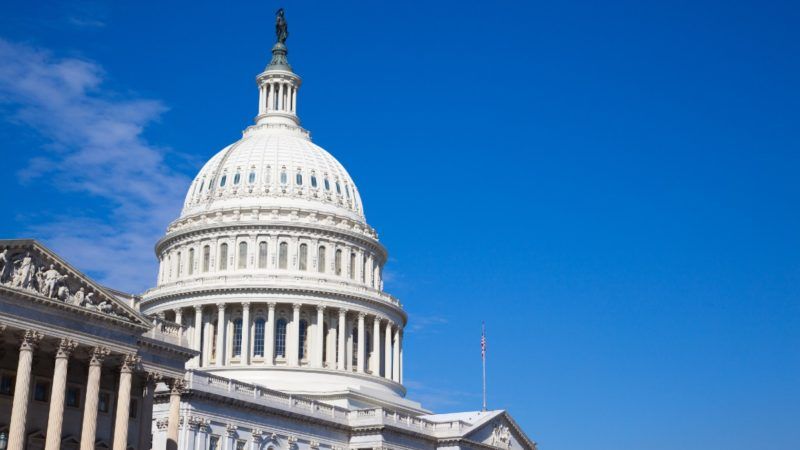New Bill Would Revive the Right To Sue Federal Cops for Constitutional Violations
The Supreme Court created, then gutted, a right to sue federal agents for civil rights violations.

Democrats in Congress have reintroduced a bill that would revive the ability to sue federal law enforcement officers for constitutional violations like excessive force, following a series of Supreme Court decisions that have made it practically impossible to do so.
Sen. Sheldon Whitehouse (D–R.I.) and Reps. Hank Johnson (D–Ga.) and Jamie Raskin (D–Md.) reintroduced the Bivens Act in the Senate and House, respectively, this week. The legislation would amend the Civil Rights Act of 1871—a federal statute that allows people to sue the government for civil rights violations—to include federal officials acting under the color of law, as well as state and local officials.
"Public officials at all levels of government, including law enforcement, should have a clear, fair standard of accountability when they break the law," Whitehouse said in a press release. "Our Bivens Act would end the confusing judicial precedent that for too long has prevented victims from holding federal officials accountable and securing compensation for constitutional violations."
In 1971, the Supreme Court ruled in Bivens v. Six Unknown Named Agents of Federal Bureau of Narcotics that federal agents may be sued when they violate someone's rights. But subsequent Supreme Court rulings over the years have steadily narrowed the scope of so-called Bivens claims to the point where it's a dead letter.
In the most recent case, Egbert v. Boule, the Supreme Court ruled in 2022 that a bed-and-breakfast owner could not sue a Border Patrol agent who had allegedly assaulted him and then retaliated after he complained. Reason's Damon Root summarized the case:
At issue were the actions of a border patrol agent who sought to question one of the guests at a Washington state bed-and-breakfast about the guest's immigration status. When owner Robert Boule told the agent, Erik Egbert, to leave his property, Egbert allegedly assaulted Boule. Then, when Boule complained about the alleged assault to the agent's superiors, Egbert allegedly retaliated by asking the IRS to investigate Boule, who was audited.
The Court ruled 6–3 that Boule could not bring a claim against Egbert for excessive force or First Amendment retaliation.
That same term, the Court declined to hear petitions involving cases where a St. Paul police officer invented a fake sex-trafficking ring and jailed a teenage girl for two years on trumped-up charges and where a Department of Homeland Security agent allegedly tried to kill a man because of an argument involving his son.
As Reason's Billy Binion wrote at the time, "A federal badge will now serve as an impenetrable shield against civil liability for violating the same laws agents are charged with upholding."
That's not just the opinion of some whacky libertarians either. Federal Judge Don Willett complained in a 2021 opinion that the Supreme Court has gutted Bivens to the extent that "if you wear a federal badge, you can inflict excessive force on someone with little fear of liability."
The Bivens Act is supported by numerous civil rights and watchdog groups, including the American Civil Liberties Union, the Drug Policy Alliance, and the Project on Government Oversight.
Editor's Note: As of February 29, 2024, commenting privileges on reason.com posts are limited to Reason Plus subscribers. Past commenters are grandfathered in for a temporary period. Subscribe here to preserve your ability to comment. Your Reason Plus subscription also gives you an ad-free version of reason.com, along with full access to the digital edition and archives of Reason magazine. We request that comments be civil and on-topic. We do not moderate or assume any responsibility for comments, which are owned by the readers who post them. Comments do not represent the views of reason.com or Reason Foundation. We reserve the right to delete any comment and ban commenters for any reason at any time. Comments may only be edited within 5 minutes of posting. Report abuses.
Please to post comments


Qualified immunity is actually a sham, and illegal, according to Congress.
Eugene Volokh had a fascinating post on this a while back.
And, if Reason will let me include a second link, here’s the second half of the story.
Thanks for both links.
Hmm, politicians trying to do something useful for once. Took them long enough, but still ... credit for effort.
Kinda makes you wonder what their ulterior motive is, doesn't it?
If Democrats support it then it must be opposed. Doesn’t matter what it is.
Come see the ideas!
Well I guess those Republicans that have been beaten and killed by federal agents would disagree.
It won't be enough unless they also very explicitly reject the judge-made concept of qualified immunity.
QI - as invidious a concept as has ever been invented by judges to protect the police and other government actors.
In a parallel universe, advocates for small government would have campaigned for its abolition. In this one, nope, in general.
In THIS universe, where the Orange Wonder Child... AKA, where the Great Whitish-Orangish Pumpkin Feather-Father rules and drools... "small government" is a pathetic concept! "Let's get small" is SOOOOO last decades, maybe even last century!!!
My question is why...why now and what is the reason they are pushing this forward? To paraphrase Red October "Democrats don't take a dump without a plan"
My follow up is will this only cover law enforcement? What about teachers and school administrators? What about prosecutors? Or are they only going after those who give more support to Republicans?
Do you have any actual proposed solutions? Other than "stop persecuting MY Sacred Tribe"?
"Hang Mike Pence"; is THAT perhaps your proposed solution? Do you have... got... anything that hasn't got any SPAM in shit?